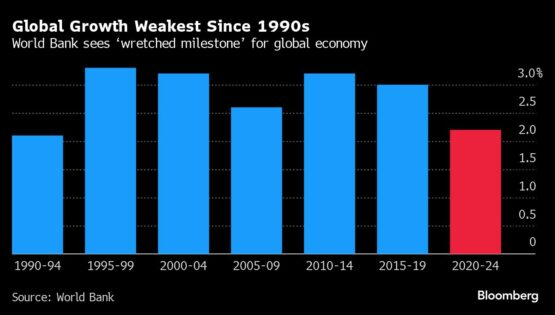The world is finding an uneasy equilibrium with a more benign economic backdrop overshadowed by a panoply of geopolitical risks, according to the final Davos panel of 2024.
The prospects of subsiding inflation and a pickup in global trade offer some encouragement for investors despite the backdrop of war and populism, European Central Bank chief Christine Lagarde and peers agreed as the World Economic Forum drew to a close.
ADVERTISEMENT
CONTINUE READING BELOW
Read all our Davos coverage here.
“Normalisation — that’s what we have begun to see,” she told the audience in the Swiss resort town, before adding an important qualifier. “It is not normality that we’re heading to,” she added.
The six-member panel was charged with summarizing the mood in Davos after a week where participants tended to put a brave face on the global outlook, accentuating the likelihood that a deep recession will probably be avoided despite unprecedented monetary tightening to bring inflation under control.
Such optimism has at times been undermined by the specter of geopolitics, with wars in Ukraine and the Middle East looming large, and Red Sea tensions too. Donald Trump’s Iowa victory on Monday, setting him on the road to the Republican nomination, was also greeted with alarm by many attendees.
“There’s so many uncertainties — and of course all the elections that we see around the world and what that may bring,” World Trade Organization Director General Ngozi Okonjo-Iweala lamented. She shared Lagarde’s view that the world is “maybe moving towards normalisation” while at the same time certainly “not normal.”
The prospect of a second Trump presidency was cited frequently during the panel discussion chaired by Bloomberg Television’s Francine Lacqua. Lagarde took a bullish stance, saying that “the best defence is attack” and pushing for strengthening Europe by creating “a real single market.” German Finance Minister Christian Lindner was more circumspect.
“We are talking too much about Donald Trump in Europe,” he said, “Doing our homework is the best preparation for possible second term of Donald Trump, and this includes our capabilities to defend ourselves.”
For David Rubenstein, Carlyle Group co-founder and co-chairman, the reality is that no matter who wins November’s election, the US faces political stasis, with all the risks that entails for the rest of the world.
“Almost everything every candidate was saying will probably not be true about what will happen in the future, because they probably won’t be able to get done what they say they’re gonna get done,” said Rubenstein, who also presents a show on Bloomberg Television.
ADVERTISEMENT
CONTINUE READING BELOW
One such worry there expressed frequently during the week was the fiscal backdrop in the US. Singapore President Tharman Shanmugaratnam perhaps alluded to that when he said that “the most important and most neglected area of public policy is fiscal reform.”
“If we don’t resolve this, something’s going to happen to the dollar,” he said.
“If the United States can’t get its fiscal act together, at some point, people are going to do what they did to the British pound and the Dutch guilder years ago.”
Earlier in the week, Deutsche Bank AG chief financialofficer James Von Moltke described a “‘pinch-me’ moment” because of his surprise at the resilience in economies and financial markets, while Harvard University Professor Ken Rogoff worried that “the geopolitical situation is like nothing I’ve seen in my professional lifetime.”
Lindner chose to take the more positive slant. He described his own country as “a tired man after a short night” as opposed to the “sick man” label that has been recently reattached to it. He also was more upbeat on the world economy.
“It is a new normal, which we have to be prepared for,” he said. “2023 has given me hope.”
© 2024 Bloomberg

